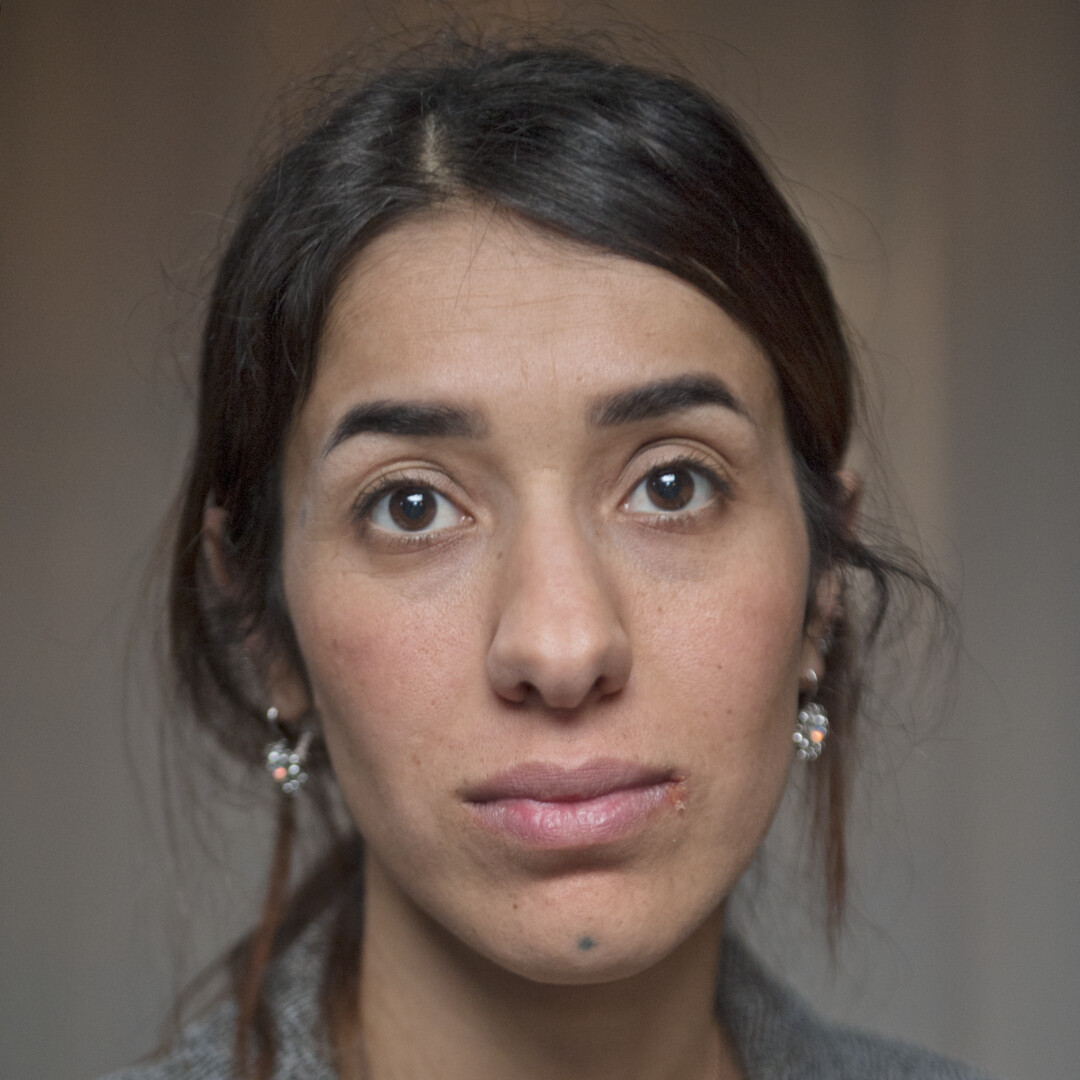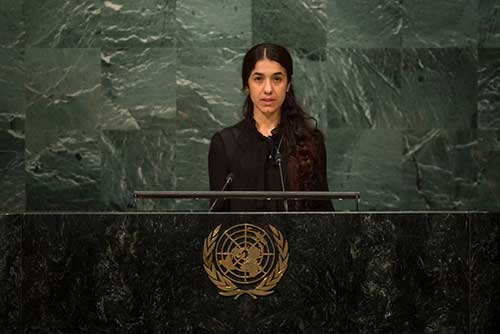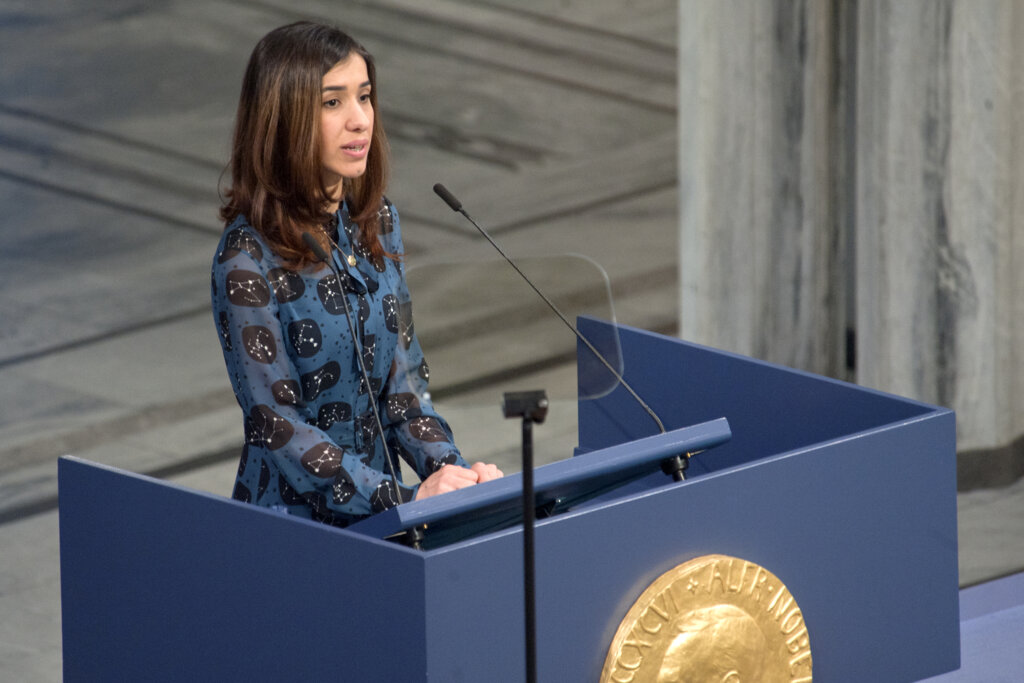Nadia Murad
Speed read
Nadia Murad was awarded the Nobel Peace Prize, jointly with Denis Mukwege, for her efforts to end the use of sexual violence as a weapon of war and armed conflict.

Full name: Nadia Murad Basee Taha
Born: 10 March 1993, Kojo, Iraq
Date awarded: 5 October 2018
The witness
Nadia Murad was born and raised a Yezidi in the village of Kocho, once a peaceful rural area in northern Iraq. On 3 August 2014, Kocho was one of the first Yezidi villages in the area to be attacked by IS. Murad’s mother and six of her nine brothers were executed. She was abducted along with around 6,800 others. Women and girls were sold as sex slaves. Murad was raped, beaten and tortured before managing to escape three months later. After receiving help in Germany, she chose to use her voice to tell the world about the abuse the Yezidi women experienced. She defied the stigma and shame that often accompanies rape. In 2016, she was appointed UN Goodwill Ambassador for the Dignity of Survivors of Human Trafficking.
"My story is the best weapon I have against terrorism, and I plan on using it until those terrorists are put on trial."
- Nadia Murad, The Last Girl: My Story of Captivity and My Fight Against the Islamic State, 2017.

A persecuted minority
The Yezidi are a Kurdish-speaking religious minority numbering around 700,000 people. Most live in northern Iraq, around Sinjar. The Yezidi have no holy book or defined articles of faith, but a set of traditions and principles. IS considers the Yezidi to be heretics and devil-worshipers and use sexual violence as part of its strategy to exterminate this minority group. IS’s genocidal campaign, which started on 3 August 2014, is still going on and threatens the future of the Yezidi people in Iraq. The UN estimates that over 3,000 Yezidi women and girls are still missing or remain captives of IS.
| Genocide Murder with the aim of exterminating an entire ethnic or religious group. The UN adopted a convention against genocide in 1948, and established the permanent International Criminal Court in 2002 to try persons accused of war crimes and genocide. |
War on women’s bodies
Sexual violence has been used strategically in countless wars and armed conflicts since the dawn of time. The systematic use of sexual violence has been documented in conflicts in DR Congo, Iraq, Colombia, Sudan, the former Yugoslavia, Rwanda, Liberia and Afghanistan. Rape, forced prostitution and forced pregnancy are used to achieve political ends, such as ethnic cleansing and the destruction of local communities. The 2018 Nobel Peace Prize underlines that sexual violence can be put on the same footing as other weapons of mass destruction, such as chemical weapons and cluster bombs.
Rape as a war crime
Since 2000, the UN Security Council has passed eight resolutions on women, peace and security. Each underlined that sexual violence constitutes a war crime. Resolution 1820 equates sexual violence with other weapons of war. Both national and international courts can prosecute war crimes. However, not all governments take this responsibility seriously, and many fail to investigate serious misconduct. In recent decades, therefore, the role played by the International Criminal Court has become increasingly important. Both Mukwege and Murad are campaigning for abusers to be brought to justice.

From the Norwegian Nobel Committee’s announcement
Nadia Murad is herself a victim of war crimes. She refused to accept the social codes that require women to remain silent and ashamed of the abuses to which they have been subjected. She has shown uncommon courage in recounting her own sufferings and speaking up on behalf of other victims.
Learn more
Nadia Murad, co-recipient of the 2018 Nobel Peace Prize, is a leading advocate for survivors of genocide and sexual violence. Nadia’s peaceful life was brutally interrupted in 2014 when Daesh (Islamic State) attacked her homeland of Sinjar – with the intention of ethnically cleansing Iraq of all Yazidis ...
Disclaimer: Every effort has been made by the publisher to credit organisations and individuals with regard to the supply of photographs. Please notify the publishers regarding corrections.
Nobel Prizes and laureates
Six prizes were awarded for achievements that have conferred the greatest benefit to humankind. The 14 laureates' work and discoveries range from quantum tunnelling to promoting democratic rights.
See them all presented here.
